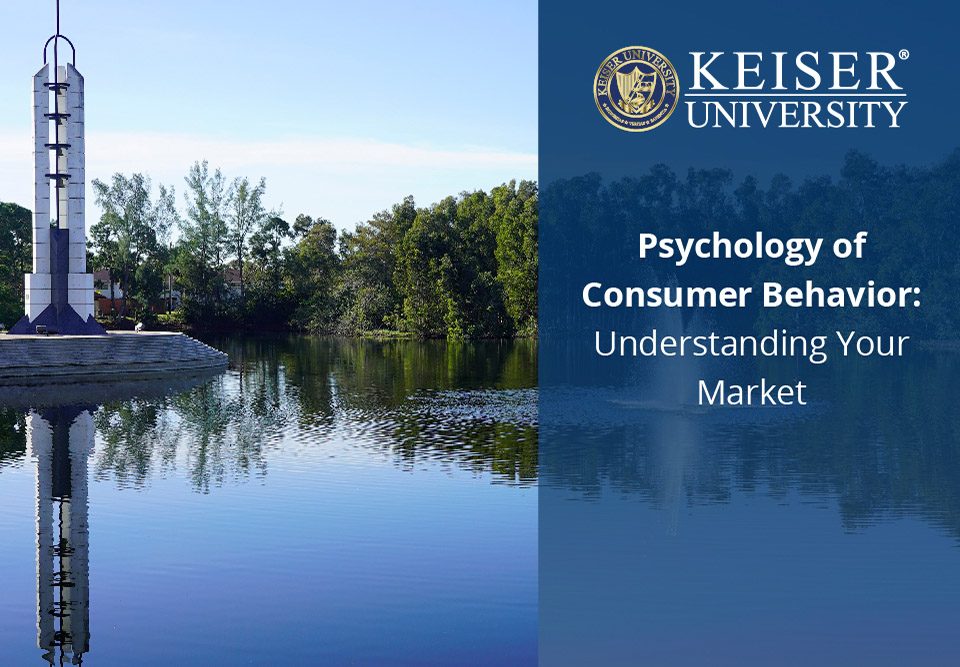Marketing is a business process designed to raise awareness about the organization’s products and services to increase revenue. In addition, an effective marketing campaign will allow an organization to develop and improve its overall brand identity.
For any marketing campaign or strategy to be successful, marketing professionals must have an in-depth understanding of the psychology of consumer behavior. Understanding consumer behavior and market trends, knowing what motivates consumers to make a purchase and to align with particular brands can guide you in crafting an engaging and effective marketing campaign that results in effective strategic decisions, customer engagement, innovation, and sustained competitive business growth for any client or organization.
What Is Consumer Behavior?
Consumer behavior is defined by the American Marketing Association as the study of how customers make decisions regarding the products that they purchase. Consumer behavior analyzes purchasing patterns to better understand the needs of customers and what motivates them to make a purchase. Having an understanding of perception, value, needs, and goals are all important aspects of consumer behavior. Consumer behavior also includes how we factor in cultural and social norms in making purchasing decisions.
Defining Consumer Behavior and Its Importance in Marketing
Understanding consumer behavior is essential for marketers because this knowledge allows them to craft marketing strategies that address the unique and personalized needs of their target audience. Consumer behavior plays an important role in marketing because it allows marketers to:
- Better understand the motivation of their target audience.
- Identify products and services that address the needs of their target audience.
- Fill existing gaps within the market.
- Grow their brand in a way their target audience relates to.
The Role of Psychology in Market Research
Marketing is considered to be a sector of the business field, but marketing professionals must also have an advanced understanding of psychology to conduct effective market research and understand consumer behavior. Marketers must base their campaigns on advanced market research grounded in consumer behavior principles. This approach ensures the strategy aligns with how consumers truly act, rather than how marketers assume they will act.
Behavioral Insights for Target Audience Analysis
Behavioral insights provide marketers with a way to better understand and analyze their target audience. Three ways marketers can use behavioral insights for target audience analysis include:
- Creating detailed buyer personas that represent the ideal customer for that organization.
- Investing heavily in market research, particularly research that emphasizes consumer behavior.
- Utilizing advanced analytics tools to track key metrics and understand the results of a marketing campaign in real-time.
Tools and Techniques for Analyzing Consumer Behavior
Marketing experts should utilize various tools and techniques to effectively analyze consumer behavior. Some leading tools and techniques for analyzing consumer behavior include:
- Search engine analytics tools, such as Google Analytics.
- Social media analytics tools, such as Meta Audience Insights or YouTube Analytics.
- Website analytics tools, such as HotJar.
Key Factors Influencing Consumer Behavior
Before you can begin a consumer behavior analysis, you need to better understand which key factors influence consumer behavior and determine which choices a consumer will make. A variety of factors influence consumer choice and behavior, including personal, socioeconomic, psychological and cultural factors.
These are the key factors that may impact consumer behavior:
Personal Factors
Personal preferences play a critical role in consumer behavior, with personal preferences for each individual customer varying based on their age, location, occupation, lifestyle and overall income. It is important to keep in mind that two consumers who look the same on paper may have totally different personal preferences and perceptions, which will ultimately shape their buying habits and purchasing patterns.
Social and Cultural Influences
Marketing researchers have discovered two primary reasons customers make purchases — to imitate those around them or to feel more accepted within their community. These motivating factors highlight the critical role that social and cultural influences can play in purchasing patterns. Individuals are often influenced by their family lives and their upbringing when it comes to shaping their budgets and making purchases. In addition, their values and beliefs will influence the type of products they want to buy and what they feel is a worthwhile purchase.
Psychological Triggers and Motivators
Psychological factors have a significant impact on the buying decisions that consumers make. Some of the key psychological triggers and motivators within consumer behavior include:
- The overall perception of the product or service and its subsequent value.
- The preconceived notions that consumers have about a particular brand or product.
- The credibility that a product has among the target audience.
How Brands Leverage Emotional Appeals
Brands can leverage the power of marketing psychology by appealing to these psychological triggers. For example, to improve overall credibility and generate buzz about a product, an organization can secure a sponsorship deal with a celebrity. This adds validity to the product and can shape the consumer’s overall perception of the product. How this is then communicated to the target audience becomes extremely important.
Behavioral Theories in Consumer Psychology
Behavioral theories in consumer psychology explore consumer behavior and provide marketers with insight into how consumers make decisions on a regular basis. Being aware of some of the most famous and influential behavioral theories in consumer psychology can help you become a better marketer overall.
These are some of the top behavioral theories in consumer psychology:
Maslow’s Hierarchy of Needs in Marketing
Maslow’s hierarchy of needs is a psychological theory that emphasizes a tiered model of human needs. The hierarchy, ranked from lowest-level needs to highest-level needs, is as follows:
- Physiological needs
- Safety and security
- Love and belonging
- Self-esteem
- Self-actualization
Marketing professionals should be aware of and familiar with Maslow’s hierarchy of needs because it can provide them with intuitive insight into the human frame of mind and what motivates purchasing decisions.
Theory of Planned Behavior
The Theory of Planned Behavior is one of the most widely used psychological theories. This theory is used not only by marketing and business professionals, but also by healthcare providers who want to improve services and outcomes for patients. The Theory of Planned Behavior suggests that consumer behavior is determined by a consumer’s intentions, attitudes and subjective norms.
Cognitive Dissonance in Purchasing Decisions
Cognitive dissonance is described by VeryWell Mind as the discomfort that an individual feels when they encounter someone that has different beliefs or values than they do. It is considered to be an uncomfortable feeling, and one that plays an important role in purchasing decisions. Often, consumers feel cognitive dissonance after making a major purchase, which can require them to return the purchase or experience regret or remorse. Understanding cognitive dissonance can help marketers preemptively avoid post-purchase regret among consumers. The conflicting thoughts then can be reduced by rationalizing their decisions, seeking advertisements to reinforce their choice, and looking to satisfied customers for reassurance.
Understanding Buying Habits and Preferences
When crafting a marketing strategy or marketing campaign, marketers also need to understand the purchasing patterns and preferences of their target audience.
Types of Buying Behaviors
Buying behaviors are described as the consistent habits and preferences of a particular market segment. Some of the most common buying behaviors include:
- Habitual — Habitual buying occurs when consumers make quick, thoughtless purchasing decisions.
- Complex — Complex buying behaviors typically occur when consumers make major purchases. This buying behavior takes more time and involves in-depth research.
- Variety-Seeking — Variety-seeking buying behaviors occur when consumers frequently purchase the same brand or product and are looking to try something new.
Identifying Trends in Consumer Preferences
In addition to identifying the types of buying behaviors that occur most frequently with your products, you also should conduct thorough market research to uncover emerging trends that may impact consumer preferences in the short- and long-term.
Analyzing Purchasing Patterns and Trends
Once you have identified common purchasing patterns and emerging trends among your target audience, you should analyze the data that you have available to better refine your marketing strategy.
Rational vs. Emotional Decision-Making
Consumers often battle between rational and emotional decision-making. Rational decision-making is considered more logical and practical, while emotional decision-making is driven more by feelings, experiences and the potential reward of a purchase. Consumers often balance the two types of decision-making processes when making their final decisions.
Understanding Demographics and Psychographics
As you begin the process of market segmentation, you will need to understand the difference between demographics and psychographics. Demographics refer to statistical information about a specific population, such as age, race, gender or location. Psychographics, on the other hand, refers to data that categorizes an audience by its interests, activities or opinions. Both demographics and psychographics play a crucial role in analyzing and understanding consumer behavior.
Tracking Online and Offline Shopping Behaviors
Consumer behaviors vary significantly depending on whether they are making purchases online or in person. Marketers need to track both online and offline shopping behaviors to develop marketing campaigns that accommodate all types of consumer behavior with their brand.
Strategies for Applying Consumer Behavior Insights
Once you have completed a consumer behavior analysis and have more insight into what motivates your target audience to make purchases, you can begin applying these insights to your marketing strategy.
Tailoring Marketing and Advertising Campaigns
First and foremost, you can use your consumer behavior insights to tailor your marketing and advertising campaigns to your target audience. By appealing directly to the customers most likely to interact with you, you will have a more successful campaign overall.
Improving Product Positioning
In addition to promoting your products, you can position them in a way so that they get the most exposure among your target audience. This is particularly important when deciding between online sales or in-person product placement.
Enhancing Customer Retention
By tailoring your products, services and marketing campaigns to the unique needs of your target audience, you will develop a greater sense of brand loyalty among your customers.
Personalization and Customer Engagement
When you have a deeper understanding of consumer behavior and how your customers interact with your brand, you can create a more personalized experience for each customer that fosters engagement and improves overall brand loyalty.
Take an In-Depth Look at Marketing Psychology at Keiser University Graduate School
Understanding consumer behavior is critically important when developing a marketing strategy for any organization. At Keiser University Graduate School, we offer several marketing graduate degree programs that allow you to explore market psychology and other advanced topics. You can choose between a Master of Business Administration, Marketing degree program as well as a Graduate Business Certificate in Marketing. In addition, we offer the MBA in marketing program as well as the marketing graduate certificate program in Spanish as well.
Contact a graduate admissions counselor to learn more about our graduate degree and certificate programs.






 The instructors at Keiser University impacted my life. They believed in my ability to become a great graphic designer, regardless of how I felt about my skills. KU helped to prepare me for the real world and got me to where I am today.
The instructors at Keiser University impacted my life. They believed in my ability to become a great graphic designer, regardless of how I felt about my skills. KU helped to prepare me for the real world and got me to where I am today.
